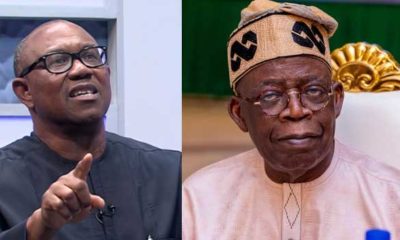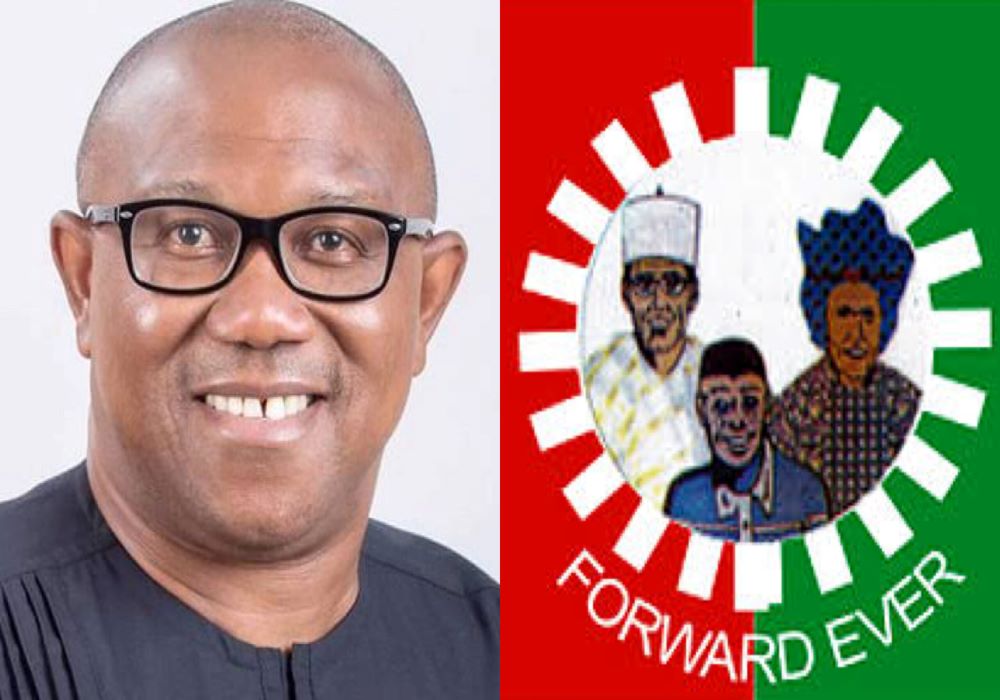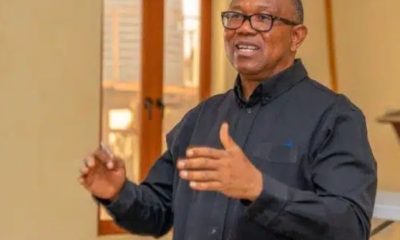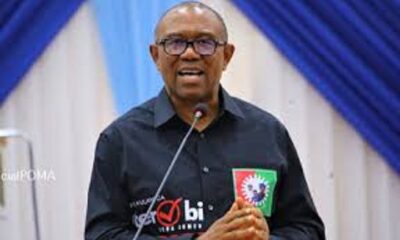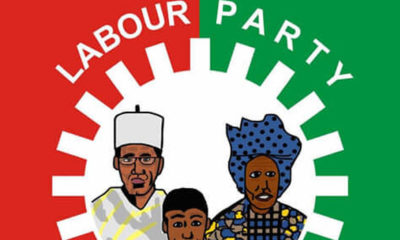Politics
Peter Obi Denies Dual Citizenship Claims

Former Governor of Anambra State, Mr. Peter Obi, has denied allegations that he holds dual citizenship in other country apart from Nigeria.
Recall that in January 2023, Mr. Peter Obi was dragged before the Court by the National Rescue Movement (NRM) political party.
The lawsuit alleged that Mr. Obi was no longer fit, proper and qualified to contest for the highest office in Nigeria on account of his alleged possession of dual citizenship.
The plaintiff in the lawsuit, marked FHC/ABJ/CS/1842/2022, accused Mr. Obi of acquiring citizenship of Dallas in Texas, United States of America, in breach of sections 1 and 137 of Nigeria’s Constitution.
Responding to the question during an interview with AriseTv on monday, Mr. Obi refuted the claim that he holds a Texas citizenship, stating that he has never applied for citizenship of any other country, including Britain or America.
Mr. Obi, who had lived in the UK for about 12 years, revealed that he had a permanent stay and an indefinite stay, which would have allowed him to remain in the UK for the rest of his life.
he said “I have never applied and I would never apply for citizenship of any other country. Am a Nigeria. I lived in the UK for a period of about 12 years. I had a permanent stay, I had an indefinite stay which means I can stay there for the rest of my life but when I left the UK in 2005, I went back to them and said ” Take back your stay” I am no longer interested.” He added.
When asked about an allegation that he could be a citizen of Solomon Island, Mr. Peter Obi dismissed the claim, stating that he had never been to the island in his life.
He said “I have never been there all my life. The few places I have gone in the Caribbean is Haiti. I was a governor when they had the earthquake. Everybody close to me know that I have been to most troubled places in the world. So, when there was earthquake in Haiti, I went to President Goodluck Jonathan and told him I was going to the country to help them rebuild and he (Jonathan) was surprised.
“That is what I have done all my life; I have been to most troubled places in the world. I withdrew my son from school and we went to Haiti. I helped them to raise money then, over $200,000. So, I have been to Haiti and also Barbados, but I don’t know Solomon Island.
“I don’t own a property anywhere outside Nigeria, except in the UK, where I lived. Other than that, if there is a property in the name of Peter Obi, it is fake and I don’t need it. Why would I own a property where I don’t live?”
Politics
APC Sets N5m Nomination Fee For Chairmanship Aspirants In Lagos LG Polls

The All Progressives Congress (APC) in Lagos State has released the official fees and guidelines for aspirants contesting in the upcoming local government elections scheduled for July 12.
According to the document, jointly signed by the party’s State Chairman, Pastor Cornelius Ojelabi, and Secretary, Dr. Adeola Jokomba, chairmanship aspirants will be required to pay a nomination fee of N5 million, along with an administrative fee of N500,000.
In a bid to encourage female participation in the electoral process, the APC reduced the chairmanship nomination fee for women to N2.5 million, though the administrative fee remains at N500,000.
READ ALSO: Okpebholo Welcomes Ikpea To APC, Expects More Defectors
Similarly, the party introduced incentives for young aspirants under the age of 40, offering them a 50% discount on the nomination fee while maintaining the administrative fee.
For aspirants living with disabilities, the party completely waived the nomination fee and fixed the administrative fee at N250,000.
Aspirants seeking councillorship positions will also pay fees, with male contenders expected to pay N1 million for the nomination form and N100,000 as an administrative fee.
Female aspirants will pay N250,000 for the nomination form, while the administrative fee remains the same.
The APC noted that youth aspirants applying for councillorship positions would also receive a 50% discount on their nomination fee, although they will still be expected to pay the full administrative fee.
For persons living with disabilities contesting for councillorship seats, the nomination form will be issued at no cost, but an administrative fee of N50,000 will apply.
The party also clarified that no separate fee will be charged for vice chairmanship positions.
“These fees shall be paid by way of bank draft in favour of the All Progressives Congress, Lagos State, State,” the guidelines stated.
Beyond the financial requirements, the APC outlined other conditions for eligibility. Chairmanship aspirants are expected to be at least 30 years old, while councillorship hopefuls must have attained the age of 25.
Academic qualifications require a minimum of a school certificate or its equivalent, with higher qualifications considered an added advantage.
The guidelines also set out the endorsement process for aspirants. For chairmanship hopefuls, five registered party members who are voters within the aspirant’s ward, local government or LCDA must endorse their nomination forms.
Councillorship aspirants will need the signatures of 20 registered party members from their wards.
The party emphasized the need for all aspirants to prove their loyalty to the APC and show active involvement in party activities.
Each candidate must also sign the party’s Code of Conduct.
“Only aspirants cleared by the Screening Committee shall be eligible to stand for election at the party’s primaries,” the guidelines noted.
In line with constitutional provisions, the APC further stressed that any party officeholder intending to contest must resign their position at least 30 days before the election or the party primary.
“All aspirants shall comply with constitutional provisions and requirements applicable to the public office they seek to contest for,” the party added.
Politics
Lad Who Stood In Front Of Obi’s Convoy Apprehended For Street Fighting – Police

The travails of Alabi Quadri, the chap who became famous by his rousing reception in front of the Labour Party’s (LP) presidential candidate Peter Obi’s convoy during Nigeria’s 2023 election has been traced to a violent street fight in the Amukoko area of Lagos.
According to the Lagos State Police Command, the 18-year-old was arrested and charged to court after being linked to street violence in January.
This was disclosed in a statement on its X handle signed by the command’s Public Relations Officer, CSP Benjamin Hundeyin, on Saturday.
According to Hundeyin, the incident happened on January 22 when a group of youths clashed in a violent street fight that caused panic in the community.
He added that several people were injured, while public and private property were damaged.
Hundeyin asserted that some innocent passersby were robbed during the chaos.
ALSO READ: Edo Prescribes Death By Hanging For Kidnappers
He wrote, “The Lagos State Police Command is aware of public concerns surrounding the case of Alabi Quadri, an 18-year-old who was remanded to correctional service following his involvement in violent attacks, public disturbance, causing extensive damage to public and private properties, and injuries to persons standing by in the Amukoko area of Lagos State earlier this year.
“On January 22, 2025 to be precise, a serious breach of public peace and extensive damage to public and private properties occurred in Amukoko when groups of youths engaged in violent confrontations that escalated into street fights for all, causing widespread violence, panic, and chaos.
“During the chaos, a number of innocent passersby were reported to have been robbed and injured.”
These, the Police spokesman maintained made officers quickly swing into the matter, with the aid of community members who witnessed the event offering useful information.
He added that victims of the robbery also gave statements and identified some of those involved.
He explained further that based on the investigation, Quadri and four others were arrested and taken to court.
He noted that the court then ordered that they be kept in custody while the legal process continues.
“In response, police officers of the command immediately launched an investigation into the incident.
“More crucial information was provided by members of the community, some of whom witnessed the incident and recognised several individuals involved.
“Victims of the robbery also came forward to give statements and positively identified the perpetrators. Following a thorough and transparent investigation, Alabi Quadri and four others were arrested and charged to court in connection with the crime.
“The suspects were remanded by the court to a correctional facility pending the conclusion of legal proceedings in the matter.
“The Lagos State Police Command undoubtedly reiterates its commitment to upholding the rule of law to ensure justice in all matters and also ensuring the safety and security of all residents,” Hundeyin added.
The command expressed commitment to justice and safety for all residents, urging the public to remain calm and allow the courts to decide the case.
“All police actions taken in this case have been in the laid-down processes and in accordance with due process, procedures, and based on credible evidence gathered during the investigation.
“We urge the public to remain calm and allow the judicial process to take its course and be fully exhausted in the case.
“The command remains open to engaging with the general public, opinion groups, and community stakeholders to transparently clarify every concern and ensure justice is served fairly and transparently.
“It’s statutory procedure in the Criminal Justice System and codes that police actions terminate where matters are taken to court.
“Members of the general public in Lagos State are enjoined to stay calm and peaceful, and allow peace to reign to ensure justice for all,” it added.
Recall that Quadri was freed on Thursday by a Magistrate Court in Apapa following legal advice from the Lagos State Director of Public Prosecutions, which found no evidence to support the armed robbery charge against him.
His lawyer, Inibehe Effiong, said Alabi’s arrest and detention were part of a “diabolical frame-up” by two local thugs known in the Amukoko area as Lege and Baba Waris.
According to Effiong, the two men allegedly kidnapped Quadri near his home and handed him over to the police, claiming he was part of a street fight.
Effiong maintained that he had been receiving threats from the same individuals since 2023 because he received donations from supporters of Obi.
The family was reportedly pressured by some community leaders to buy a cow and host a feast to make peace.
Although the case was initially said to be about a street fight, the police charged Quadri with armed robbery on January 26.
He was sent to prison along with four adults he didn’t know.
Quadri’s age was also wrongly recorded as 18, according to Effiong.
Politics
Why I Opposed Atiku’s 2023 Presidential Bid — Wike
The Minister of the Federal Capital Territory (FCT), Nyesom Wike, has revealed the real reason behind his opposition to Atiku Abubakar’s presidential ambition in the 2023 general election.
Speaking in a recent interview, Wike dismissed claims that his fallout with the former Vice President was rooted in Atiku’s failure to pick him as his running mate.
According to the former Rivers State Governor, his decision was based on principle and a deep-seated belief in power rotation.
READ ALSO: JUST IN: Wike Renders PDP Homeless In Abuja
Wike argued that after President Muhammadu Buhari’s eight-year tenure, it was only fair for power to shift to the South.
He described any arrangement that kept power in the North as unjust, regardless of personal political gains.
“I wanted power rotation; I could not have imagined that after eight years of Buhari, power would remain in the North. It is not about whether I was chosen as a running mate or not; it’s about principle. Atiku was simply not an option,” Wike stated.
When asked whether Atiku’s refusal to select him as running mate influenced his decision, Wike insisted the issue never arose, as he was never selected in the first place.
“He never dropped me as his running mate because he didn’t pick me,” Wike clarified.
Beyond the power rotation argument, the FCT Minister accused Atiku of lacking integrity. He recalled previous dealings with the former Vice President, particularly during the 2019 election cycle, which, according to him, shattered any trust he once had.
Wike recounted how Atiku, alongside former Senate President Bukola Saraki and former PDP National Chairman Uche Secondus, allegedly promised him the opportunity to nominate key figures for the attorney general and petroleum ministerial positions — a promise he claimed was never fulfilled.
“In 2019, Atiku, Saraki and Secondus came to see me and assured me I would nominate the Attorney General and Minister of Petroleum. But when the legal team was constituted, the person I was meant to nominate wasn’t even informed. I only saw it on television,” Wike narrated.
The former governor concluded that he has never trusted Atiku’s words since that experience.
“I know from day one that Atiku will never keep to his words and I’ve never banked on that. I won’t take his words to the bank,” he said.



